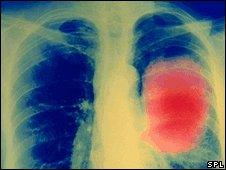Lung cancer drug 'extends life'
- Published

Lung cancer is the second most common cancer diagnosed in the UK after breast cancer
A drug called erlotinib or Tarceva can extend life for women with advanced lung cancer, experts say.
Early trial results show the drug can reduce the chances of dying by a quarter.
An American cancer conference heard how it could offer hope to those patients too sick for conventional chemotherapy.
In trials, 15% of women were alive and had no progression of their cancer 12 months after taking the drug compared with only 5% of those on a placebo.
The study involved 670 men and women with advanced non-small cell lung cancer, of whom more than half were over the age of 77.
According to Cancer Research UK, which ran the trial with funding from Roche pharmaceutical company which manufactures erlotinib, almost half of the 39,750 lung cancer patients in the UK fall into the category of being too ill for chemotherapy.
Erlotinib works by interfering with how cancer cells multiply.
Dr Siow Ming Lee, trial leader and senior lecturer at the University College London Cancer Institute, said: "These results are a real step forward in the search for an effective treatment for patients with advanced lung cancer.
"We are not yet sure why it was most effective in women but this is positive news for this large group who have few other treatment options.
"Erlotinib should be recommended for women with non-small cell lung cancer who are unsuitable for first-line chemotherapy."
The drug is licensed in the UK to be used as a second-line treatment after chemotherapy.
Kate Law, Cancer Research UK's director of clinical trials, said: "This important trial demonstrates which patients are most likely to benefit from this new treatment.
"It is encouraging to see advances being made in lung cancer treatment, especially for those patients who have few alternatives."